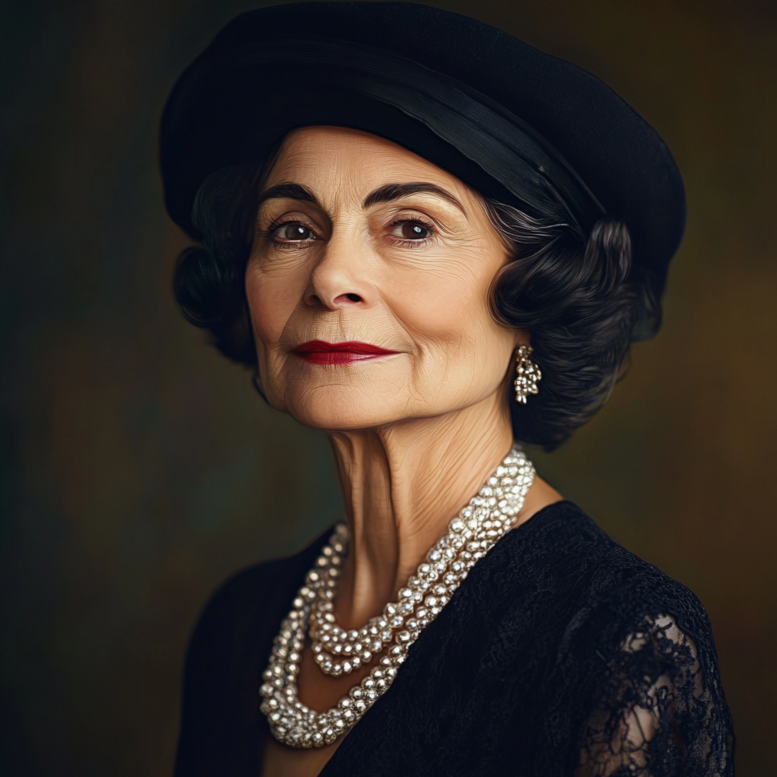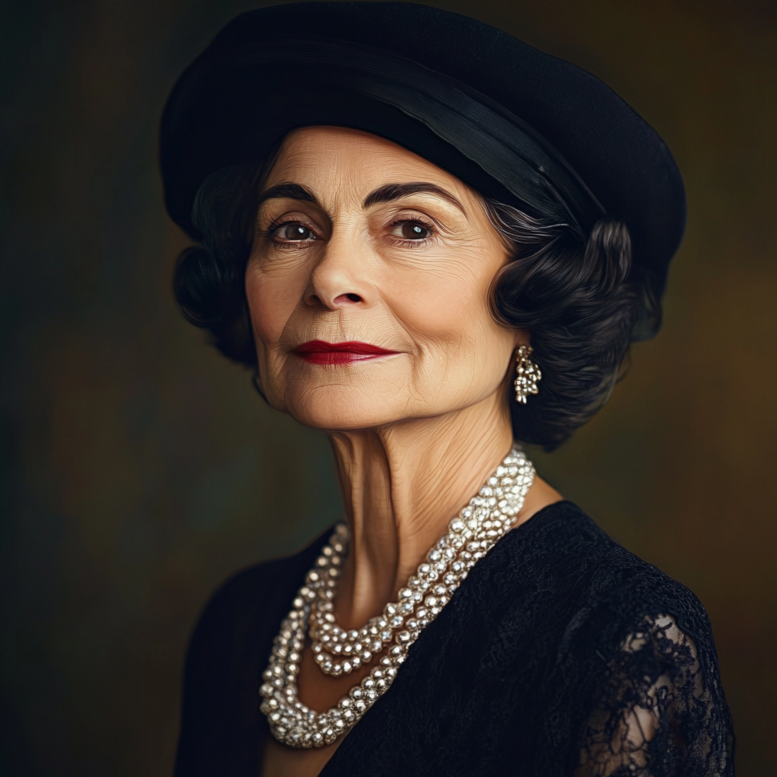


Coco Chanel (1883–1971), born Gabrielle Bonheur Chanel, was a French fashion designer and businesswoman who revolutionized the fashion industry in the 20th century. She is best known for founding the Chanel brand and for her influence on women's fashion, particularly her emphasis on simplicity, elegance, and comfort. Chanel's designs, such as the Chanel suit, the little black dress, and her signature fragrance, Chanel No. 5, remain iconic symbols of timeless style and luxury.
Birth and Family Background: Gabrielle Bonheur Chanel was born on August 19, 1883, in Saumur, France, to a working-class family. Her mother, Jeanne Devolle, was a laundrywoman, and her father, Albert Chanel, was a traveling peddler. When Gabrielle was 12 years old, her mother died, and her father abandoned her and her siblings. Gabrielle was sent to the convent of Aubazine, an orphanage run by nuns, where she spent much of her childhood.
Education and Early Work: At the orphanage, Chanel learned to sew, a skill that would later prove essential to her career. After leaving the convent at the age of 18, Chanel worked as a seamstress and a cabaret singer. During this time, she acquired the nickname "Coco," which some believe was derived from one of the songs she sang, "Qui qu'a vu Coco." Others suggest it may have been a pet name given to her by her early patrons.
Early Fashion Ventures: Chanel's entry into the fashion world began through her relationships with wealthy men, including Étienne Balsan, a French socialite, and Arthur "Boy" Capel, an English businessman. Both men supported her financially and socially, allowing her to open her first shop in 1910. Located on Rue Cambon in Paris, the shop initially sold hats under the name "Chanel Modes."
Expansion into Clothing: In 1913, Chanel expanded her business to Deauville and Biarritz, where she began designing and selling clothing. Her early designs were simple, practical, and elegant, a stark contrast to the restrictive and elaborate fashions of the time. Chanel's use of jersey fabric, traditionally used for men's underwear, was revolutionary and became a hallmark of her early success. The comfortable, casual style she promoted was particularly appealing to women during World War I, when practicality became more important due to wartime restrictions.
The Chanel Look: By the 1920s, Chanel had established herself as a leading figure in the fashion world. Her designs emphasized simplicity, elegance, and freedom of movement, reflecting her belief that fashion should be comfortable and practical. Chanel's creations, such as the Chanel suit—characterized by its straight lines, collarless jacket, and knee-length skirt—and the little black dress, became symbols of modern femininity and sophistication. She also popularized the use of costume jewelry, mixing faux pearls with real ones, and introduced the concept of the "less is more" approach to accessorizing.
Creation of Chanel No. 5: In 1921, Chanel launched her first fragrance, Chanel No. 5, which would become one of the most famous perfumes in history. The fragrance was created in collaboration with the perfumer Ernest Beaux and was revolutionary for its time. Unlike other perfumes, which typically featured a single floral note, Chanel No. 5 was a complex blend of over 80 ingredients, including aldehydes, which gave it a fresh, abstract scent. Chanel chose the name "No. 5" because it was the fifth sample presented to her, and she believed the number five was lucky.
Impact and Legacy: Chanel No. 5 was an instant success and remains one of the best-selling perfumes in the world. It was the first fragrance to bear a designer's name and marked the beginning of a new era in the luxury goods market, where fashion houses expanded their brands into fragrance and beauty products. Chanel No. 5 became a cultural icon, famously endorsed by Marilyn Monroe, who claimed she wore nothing to bed but "a few drops of Chanel No. 5."
The 1930s and World War II: During the 1930s, Chanel's business faced challenges due to the global economic downturn and changing fashion trends. However, she continued to design, focusing on more luxurious and exclusive collections. During World War II, Chanel closed her fashion house and remained in Paris, where she had a controversial relationship with a Nazi officer, Hans Günther von Dincklage. This relationship led to allegations of collaboration with the Nazis, which tarnished her reputation after the war. Chanel was briefly interrogated but was not charged, possibly due to her connections with powerful figures, including Winston Churchill.
Comeback and Legacy: After a period of self-imposed exile in Switzerland following the war, Chanel made a successful comeback in 1954 at the age of 71. Her return to fashion was met with mixed reviews in France but was enthusiastically received in the United States, where her designs were embraced by a new generation of women seeking timeless elegance and sophistication. Chanel's tweed suits, quilted handbags, and the two-tone slingback shoes became iconic pieces that have endured in popularity.
Death: Coco Chanel continued to work as a designer until her death on January 10, 1971, at the age of 87. She passed away at the Hotel Ritz in Paris, where she had lived for many years. Chanel was buried in Lausanne, Switzerland, in a grave she had designed herself.
Enduring Legacy: Coco Chanel's influence on fashion is immeasurable. She is credited with liberating women from the constraints of corseted fashion, introducing a more relaxed and practical approach to style. Her emphasis on simplicity, elegance, and comfort continues to resonate with designers and fashion lovers today. The Chanel brand, under the creative direction of designers like Karl Lagerfeld and now Virginie Viard, remains one of the most prestigious and influential fashion houses in the world.
Cultural Impact: Beyond fashion, Coco Chanel is remembered as a pioneering businesswoman who built a global brand that transcends generations. Her life and career have been the subject of numerous books, documentaries, and films, including the 2009 film Coco Before Chanel, starring Audrey Tautou. Chanel's legacy as a symbol of independence, innovation, and enduring style continues to inspire new generations.
Coco Chanel was a visionary designer and businesswoman whose contributions to fashion revolutionized the industry and left a lasting legacy. Her designs, including the Chanel suit, the little black dress, and Chanel No. 5, remain iconic symbols of elegance and sophistication. Despite personal controversies, Chanel's impact on fashion and culture is undeniable, and her name continues to be synonymous with luxury, innovation, and timeless style.

We use cookies
We use cookies and other tracking technologies to improve your browsing experience on our website, to show you personalized content and targeted ads, to analyze our website traffic, and to understand where our visitors are coming from. Privacy Policy.